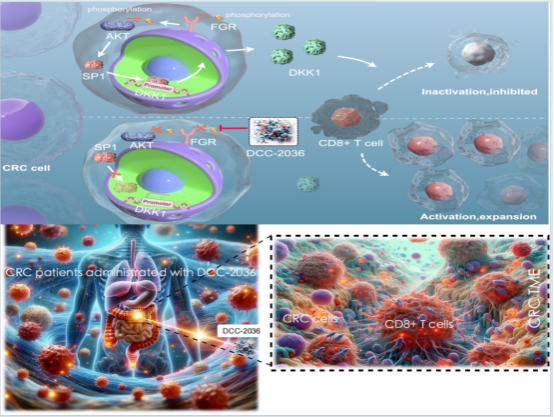In recent years, colorectal cancer (CRC) has emerged as the third most common malignancy globally,the second leading cause of cancer-related mortality, underscoring the urgent need for novel therapeutic strategies. Immune checkpoint blockade (ICB) therapy has been proven to provide new treatment options for CRC patients. However, the majority of CRCs are classified as “cold tumors”, characterized by low T-cell infiltration, which often leads to suboptimal responses to immunotherapy. Therefore, how to improve the function of CD8+ T cellstumor infiltration has become the key to enhancing the efficacy of CRC immunotherapy.

A recent study published in Cell Death & Disease (a top journal in the Q1, CAS, IF=8.1) by Prof. Xuyu Zu Prof. Yingying Shens team at the First Affiliated Hospital of University of South China, titled "Enhancing Immunotherapy Efficacy in Colorectal Cancer: Targeting the FGR-AKT-SP1-DKK1 Axis with DCC-2036 (Rebastinib)," has revealed that the third-generation tyrosine kinase inhibitor DCC-2036 (Rebastinib) significantly enhances the immunotherapeutic effects in CRC by modulating the FGR-AKT-SP1-DKK1 signaling pathway. The research showed that DCC-2036 can play an important role in the immune microenvironment by enhancing the activation/infiltration of CD8+ T cells, thereby inhibiting tumor growth. The research also for the first time discovered that the non-receptor tyrosine kinase FGR is a key target of DCC-2036, which promotes anti-tumor responses by influencing the function/infiltration of CD8+ T cells within the immune microenvironment.
In addition, the research found that DCC-2036 improves the tumor immune microenvironment,enhances the efficacy of immune checkpoint inhibitors (such as Atezolizumab) by downregulating the immune escape factor DKK1. The combined use of targeted therapy and immune checkpoint inhibitors significantly improves the treatment effect in the CRC mouse model, providing a new theoretical basispractical direction for future precision immunotherapy strategies. This research has laid the groundwork for the clinical application of DCC-2036promotes new advances in CRC immunotherapy.

This research was funded by the National Natural Science Foundation of Chinathe Natural Science Foundation of Hunan Province. Chen Xiguang, an attending physician in the Department of Gastrointestinal Surgery of the First Affiliated Hospital of University of South ChinaZeng Qiting, a postgraduate in the Department of Laboratory Medicine, are the co-first authors of this paper. The First Affiliated Hospital of University of South China is the sole affiliation for the first authorcorresponding author.

